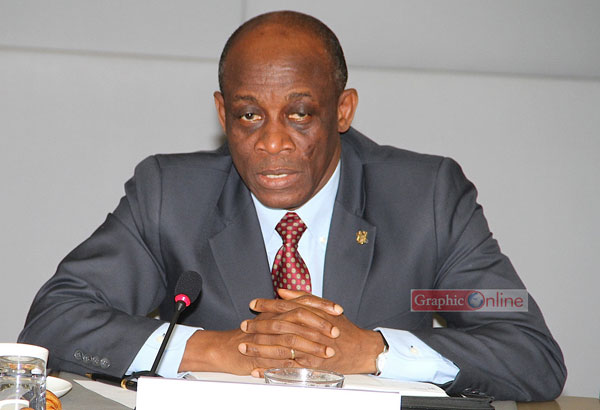
Terkper presents Review Budget to Parliament today
The Minister of Finance, Mr Seth Terpker, is expected to announce a revision of the macro-economic targets for the year as he appears before Parliament today to present the mid-year budget review.
The overall Gross Domestic Product (GDP) is expected to grow by 4.1 per cent instead of the previous projection of 5.4 per cent, while non-oil GDP (excluding oil and gas) is also expected to grow by 4.6 per cent.
These developments have taken into consideration the release of revised GDP figures for 2015 by the Ghana Statistical Service, revision of gold production forecasts for 2016-18 and the shutdown of the FPSO Kwame Nkrumah.
Production of crude oil from the Jubilee fields has reduced from 100,000 barrels per day (bpd) to an average of 90,000 bpd due to some technical challenges facing the FPSO Kwame Nkrumah since the year began.
The economy has had to bear the brunt of crude oil price volatility on the world market, with the price dropping at one time below $30 before rising to the present $45. 69 per barrel against the government’s budgeted $53 per barrel. Since the year began, the price of the commodity has dropped by 70 per cent.
Remedial actions
The minister will announce some remedial actions to help address the revenue shortfalls in order to keep to the medium term objectives of fiscal consolidation.
Mr Terkper is also expected to announce some broad remedial measures to ensure that the broad fiscal objectives are achieved.
As Ghana goes into elections later this year, there is much interest in seeing fiscal consolidation strengthened, in spite of expected spending pressures.
Reflecting the government's publicly expressed commitment to achieve this goal, the budget deficit target of 5.3 per cent for 2016 will likely be mainatained.
However, it is likely that the minister will not introduce new tax measures because of implementation of a raft of taxes since the beginning of the year with the enactment of the new Revenue Act.
Regarding the public debt to GDP, it is expected to reduce significantly from the almost 72 per cent since the end of last year to below 65 per cent due largely to the better performance of the cedi against the US dollar, and also the nominal GDP has been growing appreciably.
Public debt
For instance, during the first half of last year, the cedi depreciated by 16 per cent against the US dollar compared to less than one per cent within the same period this year.
The country’s total public debt increased marginally to GH¢105.1 billion as at the end of May this year, up from GH¢104.5 billion the previous month.
This represents 66.4 per cent of Gross Domestic Product (GDP), the total value of goods and services produced in a country within the given year.
However, it is significant to note that in dollar terms, the debt profile of the country dropped marginally from US$27.5 billion in April to US$27.4 billion in May.
This indicates that the rise in the cedi-denominated total public debt is a direct result of the exchange rate, which is now at GH¢3.94 to $1.
According to the summary of the country’s macroeconomic and financial data, posted by the Bank of Ghana on July 18, the external debt in cedi terms stood at GH¢61.9 billion at the end of May, up from GH¢61.4 billion in April. The current external debt, therefore, represents 39.1 per cent of GDP.
On the domestic front, the country’s domestic debt shot up marginally from GH¢43.1 billion in April to GH¢43.2 billion in May. This pushed the percentage figure from 27.2 per cent in April to 27.3 per cent in May.

